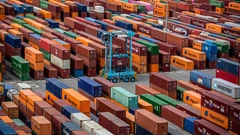Commodities Risk Lurking in ESG Funds Is Now Too Big to Ignore
(Bloomberg) -- The dark side of ESG investing has the potential to undermine a whole generation of clean-tech strategies.
Adam Matthews, chief responsible investment officer at the Church of England Pensions Board, said the risks posed to the renewables boom via the mining industry aren’t getting nearly enough attention. The upshot, according to the 47-year-old, is that portfolios intended to uphold environmental, social or good governance principles may end up being exposed to human-rights abuses and environmental damage via supply chains.

It’s an issue that led Matthews and other investors to recently form an alliance, with a view to shining spotlight on the topic to make it much harder for fund managers to plead ignorance. The Global Investor Commission on Mining 2030, which is being advised by the United Nations, plans to expose and fight what it calls the systemic risks that stem from the link between mining and the clean-energy industry.
“The auto sector is massively exposed, as are wind turbine manufacturers,” Matthews said in an interview. There’s also “huge demand” for minerals such as copper and lithium, which are “enormously important to low-carbon technology.”
But “we should be under no illusion” regarding the fact that such minerals and metals often come from areas in which “unstable government structures” are the norm, and where the dynamics around mining “play a role in conflict,” he said. The renewables boom that’s now under way risks “inflaming and exacerbating” such instability, he said.
Read More: How Lack of Copper Could Slow the Energy Transition
The building blocks needed to expand wind, solar and electric-vehicle production will require considerably more minerals and metals than combustion-powered technology. The World Bank estimates that by mid-century, the amount of raw materials necessary for the green transition will soar 500%. And with new legislation such as the US Inflation Reduction Act turbo-charging demand for clean tech, that pressure is set to soar.
“We have some companies that are good practitioners, but that’s not representative of the whole sector,” Matthews said, declining to single out individual firms.

Analysts at BloombergNEF estimate that the path to net zero may require digging up 5.2 billion metric tons of metals through 2050, which may be worth as much as $10 trillion.
Some companies are trying to reduce their exposure to risks by either looking for ways around raw materials, or taking direct control of supply lines. Tesla Inc. is redesigning batteries to avoid cobalt and nickel. General Motors Co. recently invested $650 million in Lithium Americas Corp., which is developing a mine in Nevada.
Read More: Battery Giant LG Chem Prepares to Lock In Mineral Supplies
Manufacturers in the renewables industry and their investors already face a stricter regulatory environment in some key jurisdictions. The European Union has made clear it doesn’t want to fall victim to the same dependency on the suppliers of raw materials such as lithium as it suffered with oil and gas. In September, the bloc unveiled the Critical Raw Materials Act, with the explicit aim of securing “sustainable access” to the minerals and metals needed to achieve climate neutrality.
The EU’s Corporate Sustainability Due Diligence Directive is another avenue through which the bloc plans to ensure companies screen their supply chains for ESG risks.
Such initiatives follow shocking evidence of human suffering as a result of mining. Last year, testimony gathered by nonprofit Human Rights Watch described the prevalence of child labor in the mining industry of the Democratic Republic of Congo, which sits on about 70% of the world’s cobalt. Most of that is produced at industrial projects controlled by multinational companies including Glencore Plc and CMOC Group Ltd.
Indonesia, which produces roughly half the world’s nickel, recently claimed it had overtaken Russia and Australia to become the planet’s second-biggest source of cobalt.
In South America, meanwhile, mining has had a devastating impact on local populations. In 2019, a mining waste dam at a Vale SA iron-ore mine in the town of Brumadinho, Brazil, collapsed, killing 270 people. Vale subsequently agreed to pay $7 billion to the state of Minas Gerais, which will be used in socioeconomic and environmental programs to repair the damage caused by the dam collapse.

Meanwhile China, which is the world’s biggest refiner of minerals and metals needed in batteries, relies on coal to power the plants doing that work. And coal companies such as Thungela Resources Ltd. have even tried to frame the dirtiest fossil fuel as an essential ingredient in the renewables boom.
Matthews said miners clearly play an essential role in the transition to a more sustainable economy, so excluding them from portfolios isn’t tenable for ESG investors. Sometimes, however, there’s no choice, and the Church of England Pensions Board exited its entire Vale stake as the full horror of the 2019 dam collapse became clear
The goal is to expose and isolate the bad actors, and apply much higher standards of accountability as mining’s vital role in the green transition grows.
While “we need mining,” the process of extracting raw materials for the renewables revolution can’t be “a mad scramble to meet the demands where there’s no consultation with the community,” Matthews said. Otherwise the industry will “lose the social license” to continue its work, he said.
(Adds reference to shortage of copper needed for green transition)
More stories like this are available on bloomberg.com
©2023 Bloomberg L.P.
KEEPING THE ENERGY INDUSTRY CONNECTED
Subscribe to our newsletter and get the best of Energy Connects directly to your inbox each week.
By subscribing, you agree to the processing of your personal data by dmg events as described in the Privacy Policy.
More renewables news

GB Energy Faces New Doubts as UK Declines to Affirm Future Funds
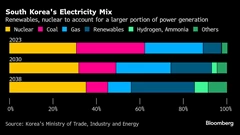
Korea Cancels Planned Reactor After Impeaching Pro-Nuke Leader
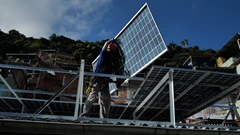
Brazil’s Net-Zero Transition Will Cost $6 Trillion by 2050, BNEF Says

SolarEdge Climbs 40% as Revenue Beat Prompts Short Covering

EU to Set Aside Funds to Protect Undersea Cables from Sabotage
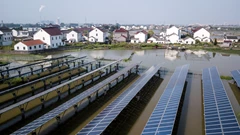
China Revamps Power Market Rules In Challenge to Renewables Boom

KKR increases stake in Enilive with additional €587.5 million investment

TotalEnergies and Air Liquide partner to develop green hydrogen projects in the Netherlands
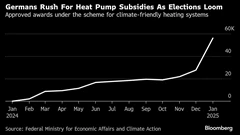
Germany Set to Scale Down Climate Ambitions
